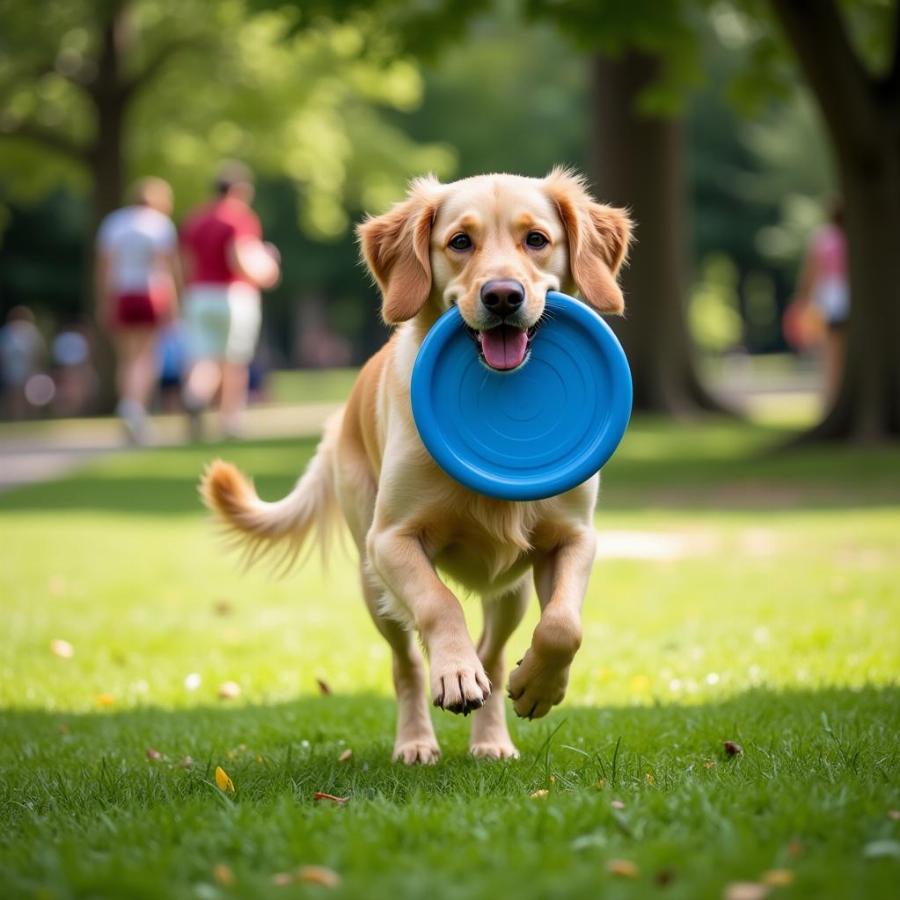We’ve all been there. You’re cuddled up with your furry friend when suddenly, a foul odor erupts, clearing the room. Dog farts, while sometimes humorously unwelcome, can be a sign of something more than just a smelly situation. So, why does my dog have gas? Let’s explore the common causes and simple solutions to help your canine companion feel their best.
Common Culprits of Canine Flatulence
Just like in humans, gas in dogs is a natural byproduct of digestion. However, excessive gas or particularly pungent odors can indicate an underlying issue. Here are some of the most common culprits:
- Diet: This is a major factor when it comes to doggy flatulence. Low-quality food, ingredients your dog might be sensitive to (like soy or dairy), and table scraps can all contribute to gas production.
- Eating Too Fast: We’ve all seen a dog gobble down their food in seconds. This speedy eating can lead to swallowing air, which in turn, leads to…you guessed it…gas.
- Food Intolerance or Allergies: Just like humans, dogs can have sensitivities or allergies to certain ingredients in their food. Common culprits include wheat, corn, soy, and dairy. These can cause inflammation in the gut, leading to gas and other digestive upset.
- Medical Conditions: In some cases, excessive gas can be a sign of an underlying medical condition like inflammatory bowel disease, parasites, or even pancreatic issues. If your dog’s gas is accompanied by other symptoms like vomiting, diarrhea, lethargy, or loss of appetite, it’s essential to consult your veterinarian.
Simple Solutions for a Gas-Free Fido
Fortunately, there are several things you can do to help alleviate your dog’s gassy woes:
- Choose High-Quality Food: Opt for a high-quality dog food made with digestible ingredients and avoid fillers like corn, wheat, and soy. Look for brands that list meat as the first ingredient.
- Slow Down Mealtime: If your dog inhales their food, try using a slow-feeder bowl or puzzle toy to make them work a little harder for their meal. This can help prevent air swallowing and aid in digestion.
- Identify Food Sensitivities: If you suspect a food allergy or intolerance, talk to your vet about an elimination diet to pinpoint the culprit.
- Regular Exercise: Just like us, dogs feel better when they get moving! Regular walks and playtime can help stimulate digestion and reduce gas buildup.
- Probiotics: Adding a dog-specific probiotic to your pup’s diet can help promote a healthy gut microbiome, aiding in digestion and potentially reducing gas.
When to Worry About Your Dog’s Gas
While occasional gas is normal, excessive or foul-smelling gas, especially when accompanied by other symptoms, warrants a trip to the veterinarian.
Here are some signs that your dog’s gas may be a cause for concern:
- Sudden change in gas frequency or odor
- Straining to defecate
- Vomiting or diarrhea
- Loss of appetite
- Lethargy or weakness
If you notice any of these signs, don’t delay seeking professional help.
Taking the Air Out of Dog Farts
Dealing with dog gas is a common part of being a dog owner. By understanding the common causes and implementing simple solutions like switching to a high-quality food, slowing down mealtimes, and ensuring regular vet checkups, you can help your furry friend live a happier, healthier, and less gassy life!
FAQs about Dog Gas
Q: Is it normal for my dog to fart every day?
A: While occasional gas is normal, frequent or excessive farting might indicate an issue with their diet or an underlying medical condition.
Q: Can stress cause gas in dogs?
A: Yes, stress or anxiety can lead to digestive upset, including gas, in dogs.
Q: Are certain breeds more prone to gas than others?
A: Brachycephalic breeds (dogs with flat faces like Bulldogs and Pugs) are more prone to swallowing air, which can lead to gas.
 Happy Dog Playing Fetch
Happy Dog Playing Fetch
Q: What home remedies can I give my dog for gas?
A: While it’s always best to consult your vet before giving your dog any home remedies, adding a tablespoon of plain pumpkin puree to their food can sometimes help with digestion.
Q: When should I be concerned about my dog’s gas?
A: If your dog’s gas is accompanied by other symptoms like vomiting, diarrhea, lethargy, or loss of appetite, it’s important to contact your veterinarian.
Seeking More Advice?
Have more questions about your dog’s digestive health or other canine concerns? Visit our articles on can i bring my dog to costco, pepcid dose for dogs by weight chart pdf, and dogs stomach making weird noises for more helpful information.
Beaut Dogs is your go-to resource for all things canine! We provide reliable, expert advice on a wide range of topics, helping you provide the best possible care for your beloved companions. For personalized support and answers to your specific questions, reach out to us at [email protected].